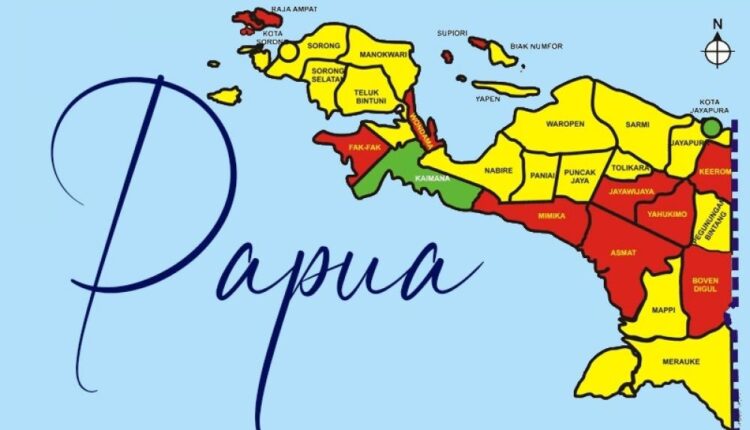Security Forces Committed to Monitoring Development for the Welfare of the Papuan People
By: Wambe Jatmiko )*
Since the issuance of Presidential Instruction Number 9 of 2017, the acceleration of development in Papua and West Papua has increasingly become a concern for the Indonesian Government. Increasing access and quality of basic services and economic development through downstreaming of superior commodities continues to be carried out.
Seven important strategies mandated by Presidential Instruction Number 9 of 2017 in an effort to accelerate development and community welfare in Papua, namely a development approach based on culture, customary areas, and a focus on indigenous Papuans (OAP); the locus of the frontier (border), remote, and underdeveloped areas (interior and mountainous areas); a dialogue approach with all stakeholders; assistance to local government officials and communities through guidance on materials/short training on planning using the THIS concept; empowerment and active involvement of local communities; empowerment of OAP entrepreneurs and local entrepreneurs through the issuance of Presidential Regulation Number 17 of 2019; and partnership cooperation with international development partners, communities, community organizations, non-governmental organizations, the private sector, and other stakeholders through mapping the operations and work of development partners.
From the various efforts that have been made, in macro terms, development achievements in the Provinces of Papua and West Papua have improved, among others, as can be seen from the improvement in the Human Development Index (HDI), the improvement in the Gross Regional Domestic Product (GRDP), and the decreasing poverty and open unemployment rates, according to data from the Central Statistics Agency. These macro development achievements are also supported by the intensive integrated sectoral development.
President Joko Widodo (Jokowi) emphasized and requested that every infrastructure development activity in Papua must be closely monitored. The monitoring referred to by President Jokowi is monitoring by security forces such as the TNI and Polri. Moreover, for areas prone to conflict such as Nduga, Wamena, and other vulnerable areas. According to him, the monitoring aims to facilitate the entire development process in order to create public welfare in Papua.
President Jokowi gave concrete examples such as the construction of road infrastructure, bridges, and other infrastructure that always get tight security from security forces. Likewise, modes of transportation such as planes or even trucks carrying logistics for infrastructure development also get the same security.
Development in Papua must be carried out more massively in order to create continuity in meeting the needs of the current generation and ensuring the needs of future generations. Deputy Minister of Home Affairs, Jhon Wempi Wetipo said that the development of Papua needs to pay attention to many things, one of which is the local context by considering the preservation of nature and local wisdom which are the keys to the success of developing Papua in the future.
In addition, he also said that one of the follow-ups that must be carried out is the importance of strengthening commitment and collaboration between stakeholders, as well as the need for innovations for Sustainable Development in Papua, including synergy from security forces.
Meanwhile, the Chief of Police, General Listyo Sigit Prabowo said that the TNI-Polri will work together to oversee all policies of the Indonesian Government related to development in Papua. The TNI-Polri have coordinated and communicated with the Government in this case the PUPR Ministry. This was done in order to find out what the obstacles are in the infrastructure development program in Papua. After the coordination process, the role of the TNI-Polri is needed to ensure that all of President Jokowi’s policies for equitable development and improving welfare in Papua can run optimally.
This is because the development of Papua is part of a program to improve the welfare of the Papuan people. Of course, the TNI-Polri must be present to ensure that all development can run well. The Government’s policies related to priority programs in Papua include the development of tourist destinations, development of urban areas, and infrastructure in agricultural areas. While the Major Project is the development of the Special Economic Zone (KEK), airport development, and several programs related to expansion, as well as special assignments of health workers in Papua and West Papua.
The Chief of Police said that in overseeing all Government policies in Papua, his party took two approaches, namely the Soft Approach and the Hard Approach . In this case, the soft approach is carried out by providing education, socialization processes, improving the quality of the education sector and human resources, so that there is a faster Transfer of Knowledge to improve the welfare of the Papuan people related to the development program currently being implemented. Even so, the TNI-Polri will also take a Hard Approach to all parties who want to thwart Government policies for the welfare of the Papuan people.
The Chief of Police emphasized that related to the problem of public order disturbances because there are indeed several groups commonly known as OPM who continue to carry out attacks, of course it has a big impact on the obstruction of the development process. Therefore, the joint security forces must take firm and measured law enforcement measures in the field, so that it is hoped that development in Papua can run proportionally.
In law enforcement, the Indonesian National Police always coordinates and communicates with Komnas HAM both at the central and regional levels in Papua. This is to ensure that law enforcement measures taken by security forces are proportional. Therefore, in accordance with President Jokowi’s direction, the TNI and Polri are ready to oversee all government policies to develop Papua and provide security and welfare guarantees for all Papuan people.
)* The author is a Papuan student living in Yogyakarta
